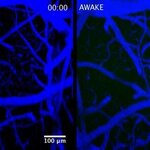
Older adults who took music lessons as children but hadn't actively played an instrument in decades have faster brain responses to sounds than those who never played an instrument, according to a study appearing in the Journal of Neuroscience.
As people grow older, they often experience changes in the brain that compromise hearing. For instance, the brains of older adults show a slower response to fast-changing sounds, which is important for interpreting speech. However, previous studies show such age-related declines are not inevitable: recent studies of musicians suggest lifelong…





